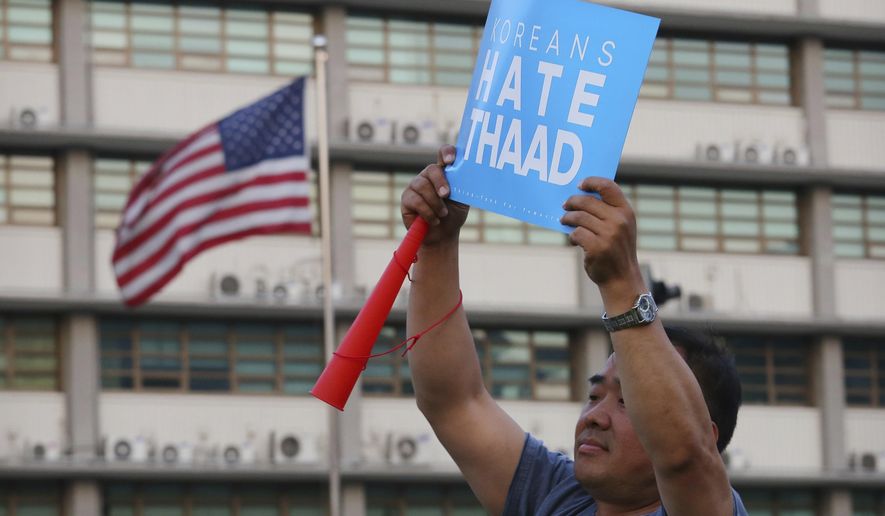SEOUL, South Korea (AP) - The Latest on North Korea test-firing a missile (all times local):
10:30 p.m.
President Donald Trump has been asked about the failure of several North Korean missile tests recently and why those launches keep blowing up.
Trump tells CBS’ “Face the Nation” television show on Sunday that he’d “rather not discuss it. But perhaps they’re just not very good missiles. But eventually, he’ll have good missiles.”
Trump also told the show he’s not going to talk about U.S. military options with North Korea because “we shouldn’t be announcing all our moves. It is a chess game. I just don’t want people to know what my thinking is. So eventually, he will have a better delivery system. And if that happens, we can’t allow it to happen.”
He also called North Korean leader Kim Jong-Un “a pretty smart cookie” for being able to hold onto power after taking over the reclusive Asian nation at a young age.
___
10:10 p.m.
Trump’s national security adviser, Army Lt. Gen. H.R. McMaster, says North Korea’s most recent missile test represents “open defiance of the international community.” He says North Korea poses “a grave threat” not just to the United States and its Asian allies, but also to China.
Speaking on “Fox News Sunday,” McMaster says it’s important “for all of us to confront this regime, this regime that is pursuing the weaponization of a missile with a nuclear weapon. This is something that we know we cannot tolerate.”
McMaster says Trump “has made clear that he is going to resolve this issue one way or the other, and what we prefer to do is to work with others, China included, to resolve this situation short of military action.”
That means, he said, working with partners in the region and globally on enforcing current U.N. sanctions and perhaps “ratcheting up those sanctions even further. And it also means being prepared for military operations if necessary.”
McMaster said North Korea “is a place where U.S. and Chinese interests overlap.”
___
9:45 p.m.
Seoul’s presidential Blue House says White House National Security Adviser H. R. McMaster has confirmed that the U.S. won’t be seeking South Korean money for the Terminal High-Altitude Area Defense system, or THAAD, currently being installed in the country’s south.
President Donald Trump said last week that he would make the Asian ally pay $1 billion for the THAAD missile defense system now being deployed in its territory.
The Blue House said in a statement Sunday that McMaster and South Korea’s Director of National Security Kim Kwan Jin spoke on the phone and reaffirmed a previous bilateral deal on cost-bearing for the THAAD deployment.
South Korea’s Defense Ministry has previously said that under an agreement reached during the administration of Trump’s predecessor, Barack Obama, South Korea offers the land and facilities for THAAD but not the cost of operations.
___
8:38 a.m.
President Donald Trump says he believes China’s president has been putting pressure on North Korea as it pursues its missile and nuclear weapons programs.
In an interview with CBS’ “Face the Nation,” Trump says he won’t be happy if North Korea conducts a nuclear test and that he believes Chinese President Xi Jinping won’t be happy, either.
Asked if that means military action, Trump responded: “I don’t know. I mean, we’ll see.”
The interview is set to air later Sunday in the U.S.
___
5:35 a.m.
Pope Francis is warning that “a good part of humanity” will be destroyed if tensions with North Korea escalate, and he is calling for diplomacy and a revived United Nations to take the lead in negotiating a resolution.
Francis was asked as he traveled back to Rome from Egypt on Saturday local time (Sunday morning Seoul time) about North Korean ballistic missile tests and U.S. warnings of “catastrophic” consequences if the world fails to stop them. He was asked specifically what he would tell U.S. President Donald Trump, who has sent a U.S. carrier to conduct drills near the Koreas, and other leaders to try to diffuse the tensions.
Francis says he would urge them to use diplomacy and negotiation “because it’s the future of humanity.”
“Today, a wider war will destroy not a small part of humanity, but a good part of humanity and culture. Everything. Everything, no? It would be terrible. I don’t think humanity today could bear it,” he told reporters.




Please read our comment policy before commenting.